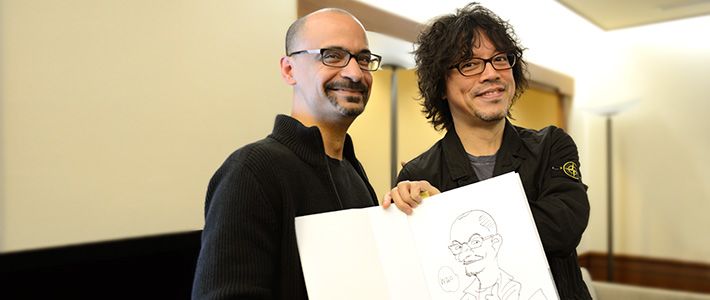
Tokyo International Literary Festival
Junot Díaz: Writing the Past, Shaping the Future
Society Culture Lifestyle- English
- 日本語
- 简体字
- 繁體字
- Français
- Español
- العربية
- Русский
Falling in Love with Tokyo
Stretching across three generations, Junot Díaz’s Pulitzer Prize–winning novel The Brief Wondrous Life of Oscar Wao ranges from the villages and sugarcane fields of the Dominican Republic to the immigrant streets of New Jersey. The novel tells the modern history of the Dominican Republic and its diaspora, blending history, fable, and coming-of-age drama into an intoxicating mixture of styles and registers. Framed around the story of a young “ghetto nerd” obsessed with role-playing games, Lord of the Rings, and Japanese comics, the novel is narrated in a thrilling polyglot voice that freely mixes English and Spanish—and surprising amounts of Japanese.
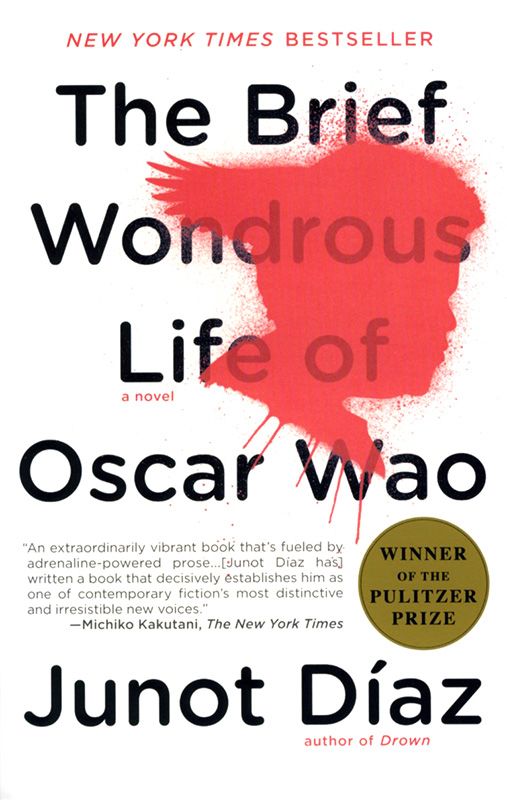 One character has “wide manga-eyes.” A flashback scene shows the Dominican countryside back in the days when “the cities hadn't yet metastasized into kaiju, menacing one another with smoking, teeming tendrils of shanties.” A young woman’s hunger for love has “doubled over like a katana being forged until finally it was sharper than the truth.” A quiet, shy girl is described as being “as still as Noh.”
One character has “wide manga-eyes.” A flashback scene shows the Dominican countryside back in the days when “the cities hadn't yet metastasized into kaiju, menacing one another with smoking, teeming tendrils of shanties.” A young woman’s hunger for love has “doubled over like a katana being forged until finally it was sharper than the truth.” A quiet, shy girl is described as being “as still as Noh.”
The references to Japan and its vibrant popular culture are no accident. The book’s author has a self-confessed love affair with Tokyo and is a frequent visitor to Japan. In an essay published in Newsweek shortly after the tsunami of March 2011, Díaz wrote of his love for the Japanese capital: “all the bells and whistles of its modernity . . . the impossible overwhelming scale . . . the castles and the temples and the costume tribes that gathered . . . on the weekends.” He was back in town recently to take part in the inaugural Tokyo International Literary Festival.
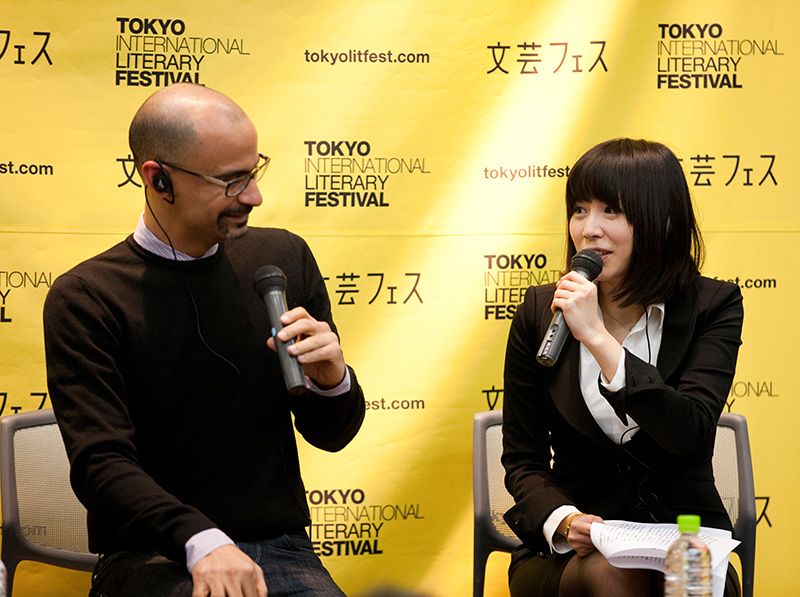 Díaz in conversation with Akutagawa Prize–winner Wataya Risa.
Díaz in conversation with Akutagawa Prize–winner Wataya Risa.
Díaz was a major presence throughout the three days of the festival, charming audiences with his relaxed, quick-witted humor, his incisive and omnivorous intelligence, and the infectious excitement he obviously felt at being back in Japan. Díaz took part in three lively discussion panels with Japanese writers on subjects that included love, masculinity, and cultural representations of the future. Along the way, he got to engage in a dialogue with one of his heroes, manga artist Urasawa Naoki—an experience that Díaz described as “the culmination of a dream.”
In a panel on “The Otaku’s Guide to Love,” in which he was joined by his Japanese translator Tokō Kōji and the novelist Wataya Risa, the youngest-ever winner of Japan’s prestigious Akutagawa Prize, Díaz reminded his audience that his interest in Japanese popular culture was not unusual. “It’s important to remember that for a certain generation of kids growing up in the States, Japanese popular culture was a baseline—an important part of our group imagination. So much of what you might call the ‘soft culture’ of Japan made its way into our childhood dreams. American cartoons were so incredibly bad. If you were ten years old, watching Scooby Doo, you’d want to hang yourself. So to see something like Starblazers, as it was called then, [the Japanese anime series Uchū Senkan Yamato, subsequently released in English as Space Battleship Yamato], where there is an overarching story that continues, it seemed very sophisticated. Anime and manga was like falling into a dream.”
“I’m such a huge fan of Urasawa Naoki”
Click to see video of Junot Díaz and Urasawa Naoki backstage after their talk.
Díaz remembered how he “came to anime and manga for the excitement, but stuck around for the secret histories of nations that are written in popular forms.” In his discussion with Urasawa Naoki, author of hit manga such as Monster, 20th-Century Boys, and Master Keaton, Díaz reflected that “we don’t discuss what we most need to discuss.” One of the attractions of Urasawa’s work, he said, is the way it gets to the heart of society and confronts the problems that most people would rather ignore. “It’s in the art forms that traditionally receive the least respect that these questions get addressed. Cultural elites characterize manga in simplistic terms. But a work like Monster examines the worst possible chapters of postwar, Cold War history. You can learn more about contemporary Japan from Urasawa-san’s works than from someone like Murakami.”
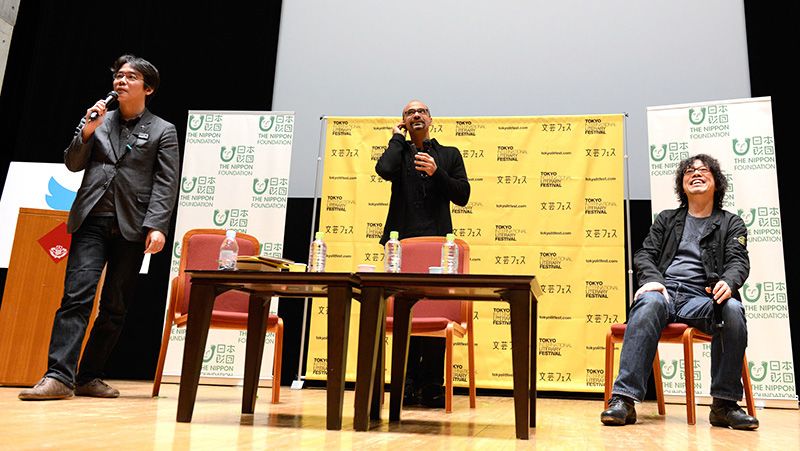 On stage at the Tokyo International Literary Festival. The two speakers are introduced by the moderator, recent Akutagawa Prize–winner Enjoe Toh.
On stage at the Tokyo International Literary Festival. The two speakers are introduced by the moderator, recent Akutagawa Prize–winner Enjoe Toh.
Díaz’s first encounter with Japan dates back to his childhood in the Dominican Republic. Many of his neighbors and friends came from families that had migrated to the island from Japan in the immediate postwar years.
“Something like 10,000 Japanese people passed through Santo Domingo port on their way to various South American countries after the Treaty of San Francisco in the early 1950s. These Japanese migrants with their traumatic histories arrived right in the middle of the Trujillo period. Their passports were taken away, so they were basically enslaved. There had been promises of farms. But they ended up being lied to by Trujillo and abandoned by their own government. And members of this generation were still around when I was growing up. They were mostly from rural areas—a lot of them from Yamagata, I remember—and most of them only saw Tokyo once, as they passed through on their way out of Japan. To us, they seemed to stand in for the experience of the whole Dominican people. They’d gone through in two years what we had in thirty. Even to me as a child, it was clear that these people were fleeing some kind of calamity. And that made sense to us, because we in the Caribbean are the children of an unending calamity.”
Trauma, Memory, and Hope for the Future
In the Dominican Republic, as in Japan after the war, a whole generation was traumatized by what it had lived through. “And when people are traumatized, they want to forget. You are not encouraged to think about the past. ‘That's all over now,’ people say. ‘It's in the past.’ But as a child, I could see what a lie that is. The past continues to live on. And so part of you wants to bear witness. I remember seeing my parents flinch when they saw a picture of Trujillo. I feel I have a duty to carry that message through to the next generation. I’m drawn to subjects that people don’t want to address. I’m of the generation that grew up after Trujillo. We had all the consequences but knew little about it. And people wanted to forget.”
In a discussion of Tokyo with Japanese writer Furukawa Hideo and Tokyo-based British novelist David Peace, Díaz remembered how Japanese manga and anime had represented the future for him as a boy. “When I was growing up, Tokyo was the future. It was a time when there was fear in the US that Japan was going to somehow eat it. But at the same time, there was a sense of admiration: If only we would do it this way . . . There was a whole discursive vernacular of Japan as the future.”
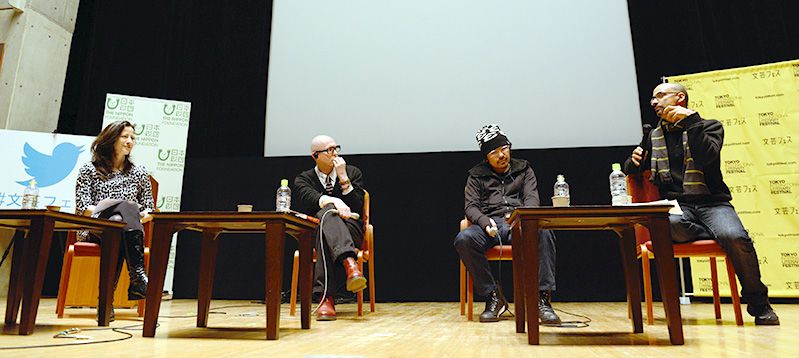 From left to right: Deborah Treisman (The New Yorker), David Peace, Furukawa Hideo, Junot Díaz.
From left to right: Deborah Treisman (The New Yorker), David Peace, Furukawa Hideo, Junot Díaz.
During his discussion with Urasawa, Díaz reflected on how things have changed, and underlined the importance of imaginative versions of the future such as those offered by Urasawa’s manga: “My generation was always told to think about the future. Our toys were all futuristic—rockets and robots and so on. But I have a little brother, 20 years younger than me, and for him the future is something scary. He’s always worried that he’ll never find a job, never be able to afford a house. But thinking about the future is like a muscle. Society encourages you not to work out those muscles, to always live in the present. You’re easy to manipulate if you have no point of comparison. You can’t dream of better things. It is thinking about the future, and thinking about the past, that allow us to confront power.”
Several of Díaz’s fellow panelists expressed concern about contemporary Japan: the country’s increasing introversion and worrying signs of a collective loss of nerve and ambition among the younger generation. Why, several members of the audience wanted to know, were Japanese otaku not able to follow Oscar Wao’s example and take the initiative to go in search of love and happiness? But Díaz, who wrote movingly of Tokyo’s resilience and endurance in his Newsweek piece, said he remained optimistic. “Historical moments are very brief. We may seem to be stuck in a moment now, but we always have the power to change our societies. We have shown repeatedly that collectively we can be very surprising.”
Reading Japanese Writers in Translation
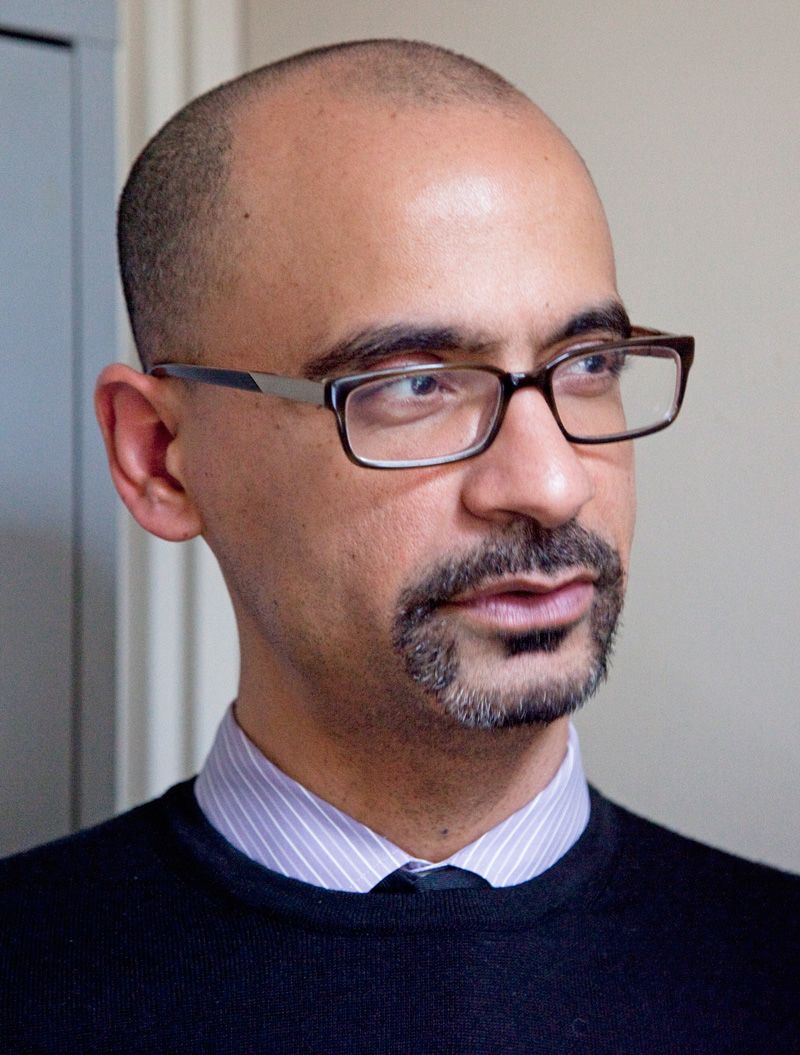 Speaking to Nippon.com during the festival, Díaz expressed his admiration for the Japanese writers with whom he shared a stage over the weekend. “Furukawa Hideo: I really enjoy his weird, science fiction-y stuff, which I’ve read in Monkey Business. I love that magazine; I’ve been getting it since the very beginning. And Wataya Risa. Her stories about relationships are scary, man. I’m like: God, so that’s what I sound like? I’d like to know more about how Risa sees herself alongside other Japanese writers, actually, because a lot of the brutality in the work I read of hers was clearly resonating with writers like Ogawa Yōko, Kirino Natsuo, and Kawakami Mieko. I’m a big fan of Ogawa Yōko—Hotel Iris and her new collection, Revenge. The Housekeeper and the Professor is brilliant. Four of Kirino Natsuo’s books have been translated. I’ve read them all, and they’re really great.
Speaking to Nippon.com during the festival, Díaz expressed his admiration for the Japanese writers with whom he shared a stage over the weekend. “Furukawa Hideo: I really enjoy his weird, science fiction-y stuff, which I’ve read in Monkey Business. I love that magazine; I’ve been getting it since the very beginning. And Wataya Risa. Her stories about relationships are scary, man. I’m like: God, so that’s what I sound like? I’d like to know more about how Risa sees herself alongside other Japanese writers, actually, because a lot of the brutality in the work I read of hers was clearly resonating with writers like Ogawa Yōko, Kirino Natsuo, and Kawakami Mieko. I’m a big fan of Ogawa Yōko—Hotel Iris and her new collection, Revenge. The Housekeeper and the Professor is brilliant. Four of Kirino Natsuo’s books have been translated. I’ve read them all, and they’re really great.
“There are always difficulties involved when you have to use translation, but it’s a small price to have to pay to be able to communicate with an artist and community with whom you might otherwise have no contact. I come from a country where there’s very little translation going on, so I’m very grateful that anyone wants to be in a conversation across languages.
“The experience I have as an American-Dominican writer being translated into Japanese is basically the experience of all writers. We publish a couple of thousand copies at most. And so when even one person in Japan writes me a nice note, that’s a really big deal. Then at least you feel you’ve done your job!”
After his inspiring appearances alongside some of Japan’s leading young writers this weekend, Díaz will surely be receiving more fan mail from Japan in the future.
(Photographs by Kawamoto Seiya and Kodera Kei. Video by Tanaka Masayuki. With thanks to the Nippon Foundation.)
anime pop culture otaku manga Wataya Risa David Peace Tokyo International Literary Festival Oscar Wao Furukawa Hideo Junot Diaz Urasawa Naoki